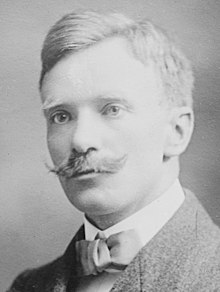Paul Hazard
Paul Hazard (born April 30, 1878 in Noordpeene , † April 12, 1944 in Paris ) was a French historian and essayist.
Life
Paul Hazard came from a family of teachers; his father and grandfather were teachers in Noordpeene, in French Flanders . Paul attended the village school and obtained his certificate d'études in Arnèke . At the grammar school of Armentières , which bears his name today, he pursued classical studies.
Normalien , Agrégé de lettres, he became professor at the Sorbonne in 1913 and in 1925 the chair of modern and comparative literature at the Collège de France . In 1929 he was elected to the American Academy of Arts and Sciences . He was elected a member of the Académie française in 1940. He died in Paris on April 12, 1944, shortly before the liberation.
Important works by him are La Crise de la conscience européenne. 1680–1715 (The Crisis of the European Spirit. 1680–1715) from 1935 and La Pensée européenne au XVIIIe siècle, de Montesquieu à Lessing (The Reign of Reason. European Thought in the 18th Century) from 1946.
Quote
“What is Europe? Thinking that is never satisfied. Without pitying himself, he ceaselessly pursues two traces: that of happiness and that of truth, which is even more indispensable and even more dear to his heart. Hardly has it reached a state which seems to correspond to this double requirement, it notes, it knows that its unsteady hand is only holding something preliminary, something relative; and the desperate search that is his fame and his torment begins again. "
Works
- La Révolution française et les lettres italiennes, 1789–1815. Thèse présentée à la Faculté des lettres de Lyon (1910)
- Journal de Ginguené 1807-1808. (1910)
- Giacomo Leopardi (1913)
- Un examen de conscience de l'Allemagne: d'après les papiers de prisonniers de guerre Allemands. Paris: Bloud et Gay, 1915
- La ville envahie (1916)
- L'Italie Vivante (1923)
- Histoire illustrée de la littérature française (avec Joseph Bédier , 2 vol., 1923–24)
- Lamartine (1925)
- La Vie de Stendhal (1928)
- Avec Victor Hugo en exile (1930)
- Don Quixote de Cervantès : étude et analyze (1931)
- La Crise de la conscience européenne: 1680-1715 (1935)
- Le Visage de l'enfance (1938)
- Quatre études. Baudelaire . Romantiques. Sur un cycle poétique. L'Homme de sentiment (1940)
- La Pensée européenne au XVIIIe siècle, de Montesquieu à Lessing (1946).
- Les Livres, les enfants et les hommes (1949)
German translations
- The crisis of the European mind. 1680-1715. Translated from the French by Harriet Wegener . Hamburg: Hoffmann and Campe 1939.
- John Locke (1632–1704) and his age. Translated from the French by Harriet Wegener and Albert E. Brinckmann . Hamburg: Hoffmann & Campe 1947.
- The rule of reason. European thinking in the 18th century. Translated from the French by Harriet Wegener and Karl Linnebach . Hamburg: Hoffmann & Campe, 1949
- Stendhal: how he lived, wrote and loved. Hamburg: Hoffmann & Campe, 1950.
- Children, books, and tall people. Foreword by Erich Kästner . Translated from the French by Harriet Wegener. Hamburg: Hoffmann and Campe Verlag 1952.
literature
- G. Saintville: Bibliography des oeuvres de Paul Hazard. Paris 1947
- Margaret C. Jacob: The Crisis of the European Spirit. Another look at Hazard , in: Jonathan Israel , Martin Mulsow Ed . : Radikalaufklerung , Suhrkamp, 2014, pp. 20 - 48. Translated by Nora Pröfrock (first English in Politics and culture in early modern Europe , Cambridge 1987, p. 251–271)
Web links
- Literature by and about Paul Hazard in the catalog of the German National Library
- Short biography and list of works of the Académie française (French)
- Full text of the two main works (French)
| personal data | |
|---|---|
| SURNAME | Hazard, Paul |
| BRIEF DESCRIPTION | French historian and essayist |
| DATE OF BIRTH | April 30, 1878 |
| PLACE OF BIRTH | Noordpeene |
| DATE OF DEATH | April 12, 1944 |
| Place of death | Paris |
